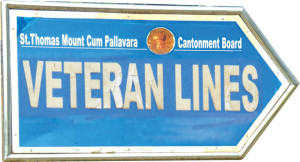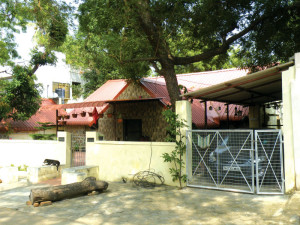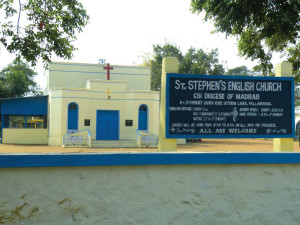Registered with the Registrar of Newspapers for India under R.N.I 53640/91
Vol. XXVI No. 23, March 16-31, 2017
Veteran Lines – A forgotten corner of a suburb
– Bryan Oliver Peppin
So many people have the fondest memories of the Anglo-Indian pockets of old. The list of such places is pretty long, but the ones that stand out in Tamil Nadu are Madras, Golden Rock, Madura, Trichi-no-poly, Villupuram, Arkonam, and Podanur.
Almost all these places have strong connections with the Indian Railways, many as an Anglo-Indian pocket has fallen by the wayside, for there is minimal Anglo-Indian presence in the railway today.
Still hanging on, but only just, is the non-Railway Anglo-Indian colony known as -Veteran Lines in Pallavaram, suburban Madras. Tucked away between the Chennai Airport runway on the southern and western side, and the hill overlooking Trisulam Railway -Station, the newly com-missioned Metro and the -modern Airport beyond, on the -opposite side, stands Veteran Lines, a haven of peace and tranquility and one of the last bastions of Anglo-Indian community life.

The name of the locality is, in itself, quaint. Adjacent to the Grand Southern Trunk Road on the Airport side, almost all the way to what is known variously as English Electric, GEC, Areva, and Alstom, in Palla-varam, the area known as ‘Officers’ Lines’. Behind this row of large bungalows, beyond the barracks and the parade ground, is what could be heaven on earth – Veteran Lines. -Perusing the records of the iconic St. Stephen’s English Church, I discovered that the Cantonment area was the hub of the EAV Company, EAV -actually expanding to ‘European Artillery Veterans’. Did Veteran Lines get its name from this military company? The -‘Officers’ Lines’ in the immediate vicinity lends weight to this assumption, and the area was probably peopled by European under-officers and NCOs, as well as those from the mixed race – the Anglo-Indians.
St. Stephen’s English Church in Veteran Lines came up in 1935, but the records go way back, since it was originally attached to St. Thomas’ Garrison Church in the Cantonment area of St. Thomas Mount. Four Anglo-Indian women, Mrs. Lightfoot, Mrs. Drinkwater, Mrs. Gomes and Mrs. McKen-zie, were instrumental in collecting funds for the construction of the Church, and, much later, the school was developed around it. There were a few Protestant families among the AIs of Veteran Lines, and there are some even today, but the Church has a special place in the hearts of worshipers, especially because, even now, it has a serene, homey atmosphere.

Veteran Lines today comprises some sixty to seventy, fairly big-sized houses, a few spanking new, most of the others in varying degrees of decay. I would not be far off the mark if I say that, until Independence, there weren’t any other communities living in the area. Of course, some properties changed hands, but the buyers were mostly Anglo-Indian. My own home, long before my time, was sold to the milkman to settle his dues, but until the 1950s at least, most properties were owned by Anglo-Indians. Today there are just a dozen families from the community who live in and sometimes own properties here and the number has fortunately remained stable since the late 1980s.
Imagine a small (big enough for us, though), compact community living its own life, at its own pace, in its own inimical way, and you have the essence of life in Veteran Lines in the 1950s, the 1960s, the 1970s and even the 1980s. Imagine neighbours coming and going freely, sharing a cuppa here or a glass of OT or wine there, or even a bottle of Cowl Bazaar’s famous home-brewed arrack with a tickle of beef fry or vindaloo to aid the process of imbibing such a potent drink. Imagine weekend parties, Sunday-morning fishing adventures at the nearby river, the Bingo evenings, the sing-along nights that went on till early morning, the songs becoming louder and smuttier as time rolled by. Imagine the Devotions to the Mother all through May, in a different home each day.

Imagine the whole community in and around Pallavaram meeting at the English Electric grounds for the Annual “Mini-Olympics”, complete with torch, banners and stiff competition between the four or five rival teams. Imagine groups of carol-singers willing to sing more than half-a-dozen songs at every home and happily partake of the refreshments so generously provided by most families. I am certain that a down-to-earth, not-so-genteel Jane Austen would have reveled in such a setting, and she would have most surely done more justice to the place and the people than yours truly.
All these joyous congregations would not have been what they were if not for the bond that brought everyone together as a single unit – the one and only Pallavaram Recreation Club or PRC, for short. I really don’t know when the PRC actually started functioning, but it was certainly doing wonderfully well in the 1940s. The trend continued right through to the early 1990s, and I must confess that I was the last acknowledged President of the Club. When I returned to Pallavaram after a short stint in the Gulf, the PRC had disappeared and the Anglo-Indian Association tried its best to take its place. But, as the super-seniors and seniors will tell you, and even a late-comer like I could, the passing of the PRC was felt by the old and the young alike. These experiences are now memories, and even these are fading fast because most people nowadays do not know how to unwind, or “chill”, or even just hang out. Anyway, all you Veterans, wherever you are, take heart: a revival is on the cards.
Veteran Lines was a great place for the young. In those days when TV and computers held little or no attraction, boys (and sometimes girls) trooped off to the huge military well in the colony, or went to the abandoned quarry that was always filled with water. Pallavaram hill often beckoned, the more adventurous choosing a direct climb up the hill, rather than using the road to the top. Mango season lasted at least two months and since the mangoes next door always tasted better, midnight raids were fast and furious and very seldom did any of the raiders get caught. If the night offered no real entertainment, there was always recourse to the old ‘Kottai’ or cinema-house situated in no-man’s-land, as seasoned ‘Veterans’ will describe the tract of land between the colony and Pammal beyond. The cinema-shed has disappeared, but many Anglo-Indians, including myself, rejoice because its place has now been taken by a booze shop.
The heyday of Anglo-Indian life in Veteran Lines had almost vanished when I arrived in the late 1980s. Even our very own bus – Route 52-G – has been taken from us; it plies another circuitous course. And even the formerly famous (or infamous) ‘Loafer’s Bridge’ next to the School Bus-stand is gone, just a piece of the culvert’s brick-work standing mutely by. The nearby mini-hockey field is in a mess now, abandoned by everyone today, but it used to be bustling with Anglo-Indians, young and old, eager every Sunday for a game, not too long ago.
We always take pride in our musical talents, and Veteran Lines has had its share of musicians. There was Cliffy Phillips, the lead-guitarist, and Shad Bronkhurst, the excellent jazz-guitarist – guys who have passed on. We still have the versatile Raymond Julian, singer, guitarist and composer, his brother Reginald who likes to lend a helping hand, Irwin Netto, the connoisseur’s lead guitarist, Trevor Starr the bass guitarist, John Fernandez on keyboard and mouth-organ, Eric Ed-monds, singer and keyboard-player, Dave Thomas, singer and guitarist, and Gerard D’Nazareth and Kimberley Daniels, drummers. Once, while some of these guys were practising in the house next to mine (where Raymond was then staying), Deb – my wife – and I could not help taking the floor, which happened to be the newly-laid concrete road in front of our homes. Just think, can you dance in public (yet in total privacy) anywhere else in the world? That is Veteran Lines – Heaven, a real Heaven on earth.
The Christmas season is still welcomed with zest and fervor every year. On the very first day of December, the Tree comes out to be decorated and the Christmas records leave their storage place. Over the next few days the special delicacies are prepared – plum cake, seed cake, rose-cookies (as we knew them), kul-kuls, diamond-cuts, murukkus, coconut sweets, dhol-dhol, and whatever else. Visitors, from India or abroad, trickle in, to enjoy the company of old friends as well as the festive, yet sedate, atmosphere. The days when dances were organised in Veteran Lines have gone, but a few private parties do take place. In the past, shows at the Shiraz, Abbotsbury, or Hawk-field would be thronging with AIs from everywhere, but even these entertainments have disappeared.
But life goes on, as it always does; and, of course, good things always have a knack of lingering on, at least in the memory. (Courtesy: AITW)


Comments